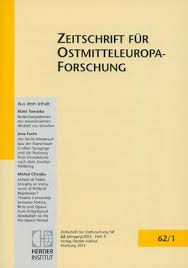„Heimaturlauber“. Westdeutsche Reiseerlebnisse im polnischen Schlesien vor 1970
Heimat Vacationers: West German Travel Experiences in Polish Silesia before 1970
Author(s): Andrew DemshukSubject(s): Social history, Post-War period (1950 - 1989), Cold-War History
Published by: Verlag Herder-Institut
Keywords: Heimat Vacationers; West German Travel Experiences; Polish Silesia before 1970;
Summary/Abstract: This article explores both the personal and social repercussions of West German expellee travel through former homeland [Heimat] spaces east of the Oder and Neisse rivers in the middle of the Cold War. On the basis of Heimat periodicals, Heimat books, published and unpublished travel accounts, and a variety of state and local archives, I contend that the experience of travel in the old Heimat led expellees to realize in the most rapid and moving way possible that the world they remembered had become a foreign land which they could never inhabit again. Travelers then brought this realization back with them into West Germany and spread it among their friends, family, and acquaintances. As a result, though expellee political spokespeople asserted that eastern Germans would gladly move back to their “rightful” homeland, many Silesians, Pomeranians, and East Prussians had already come to realize that there was no going back long before the 1970 Warsaw Treaty recognized Poland’s western border. I begin my analysis amid the East-West thaw in the mid-1950s, when a few expellees first found it possible to visit their old homeland spaces for the first time since their flight and expulsion. While visiting Upper Silesia in April of 1956, a West German expellee was addressed by one of the remaining natives as a Heimaturlauber, a “Heimat vacationer.” In my view, this term embodies how these travelers came to see themselves when they traveled back to their old homes in the East. Experiencing the former German territory of Silesia as Heimaturlauber, former residents came to recognize that they were no longer at home in the Heimat. The dramatic changes of little more than a decade had made them outsiders. This sense of alienation intensified as, in painstaking detail, they recorded the sheer extent of change – the disappearance of German script and monuments, the ruin of many edifices they had known, and the absence of old friends and neighbors. In place of the Heimat they remembered and tended to idealize, they found a Heimat transformed, often interpreted with negative qualities such as filth and disorder that recalled old German stereotypes about Poles. As in the midst of their journeys Heimaturlauber encountered contemporary Polish residents, their negative impressions often gave way to the realization that human beings with unique needs and desires now resided in the old Heimat and were making it their own. Expellee reflections often culminated with a new awareness at the end of their journeys when they bid their “farewell” to the Heimat: despite a lingering sense that they had suffered injustice through the loss of their old homes in the East, they departed with the knowledge that their physical Heimat was now in the West, while the Silesian Heimat they had known only survived in their memories.
Journal: Zeitschrift für Ostmitteleuropa-Forschung
- Issue Year: 60/2011
- Issue No: 1
- Page Range: 79-99
- Page Count: 21
- Language: German

